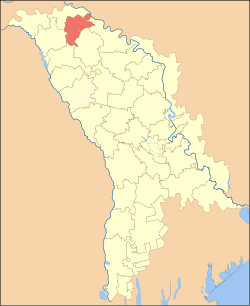Donduseni District
| Dondușeni | |
|---|---|
| District (Raion) | |
 |
|
| Country |
|
| Administrative center (Oraş-reşedinţă) |
Dondușeni |
| Government | |
| • Raion President | Anastasie Pavlov |
| Area | |
| • Total | 645 km2 (249 sq mi) |
| Elevation | 247 m (810 ft) |
| Population (2012) | |
| • Total | 44,800 |
| • Density | 69.5/km2 (180/sq mi) |
| Time zone | EET (UTC+2) |
| • Summer (DST) | EEST (UTC+3) |
| Postal Code | 251 |
| Area code(s) | +373 51 |
| Car plates | DN |
Dondușeni District is a district (raion) in the north of Moldova. Its administrative center is the city of Dondușeni. As of 2011, its population was 45,100.
The earliest attestations historical towns down in 1437 when the district is certified Teleșeuca village. Other localities that Arionești, Corbu, Crișcăuți, Horodiște and Tîrnova are documented during 1463–1470. In the following centuries district towns or developed both socially and culturally. In 1812 the Treaty of Bucharest, Bessarabia is occupied by the Russian Empire as a district for more than 100 years (1812–1918) Russian administration fall. In spring 1888 construction start Bălţi–Ocniţa railway which ended in 1893. Railway history is closely linked to Donduşeni city during the years 1902–1905 the building near the railway station, built in 1892, held the construction of pumping station and water tower, two warehouses for grain and a ramp load, two kilometers of road and three houses. 1918 register a new page in the history of Bessarabia. On 27 March, Sfatul Țării of Bessarabia voted for the Union of Bessarabia with Romania. As a member of the Country's Council vote for Grand Union and Simeon Galiţchi (1887–1940), sergeant major of the infantry regiment of Odessa, a native of Donduşeni and ardent patriot of the Romanian people, who died in summer 1940 as a result of Stalin's Great Purge. Following the pact between Hitler and Stalin from 26 June 1940 the fate of Bessarabia was determined by military force. On 22 June 1941 include the start of 1418 days and nights of fierce and bloody fights between the Germans and Soviets. In this period perplexed more than half the male population was mobilized to Donduşeni station and sent searing flames of war. Eternal remembrance of the 17 men of Donduşeni that victory came at the cost of life. During the 1946–1947 district endure hunger caused by the communists. In 2004 the district population was 47,400.
...
Wikipedia
